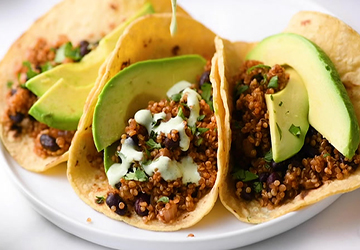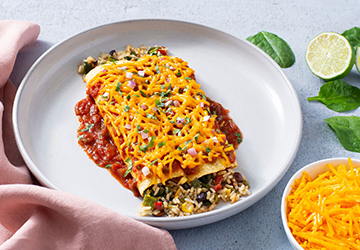In the last decade, there has been a significant surge in veganism. As people become more conscious of their health, the environment, and animal rights, a growing demand for vegan products and recipes is growing. This article is for you if you've been considering switching or simply integrating more vegan options into your diet. We'll explore some fantastic vegan protein sources, share some delightful plant-based meal ideas, and introduce you to some easy vegan ingredient swaps.
Vegan Protein Sources: Not Just Beans and Tofu!
While many associate vegan protein with tofu and beans, the vegan world offers much more. Here are some must-try sources:
● Quinoa: This superfood isn't just carb-rich; it's also an excellent source of protein, packing all nine essential amino acids.
● Lentils: Versatile and delicious, they can be integrated into soups, stews, and salads.
● Chia seeds: These tiny powerhouses are great for making puddings, smoothies, or even egg replacements in baking.
● Seitan: Made from gluten, it's often called 'wheat meat' because of its meaty texture.

Plant-based Meal Ideas: Beyond Salads
Going vegan means you can eat salads all day. Here are some wholesome plant-based meal ideas:
● Chickpea Curry: Using chickpeas as the primary vegan protein source, this flavorful dish is both comforting and nutritious.
● Vegan Tofu Stir-fry: Mix the tofu with your favorite veggies and a savory sauce for a quick and delightful meal.
● Quinoa and Black Bean Tacos: Ditch the meat and try quinoa and black beans as your filling, topped with fresh guacamole and salsa.
● Lentil Soup: Packed with veggies, herbs, and spices, this is perfect for a hearty lunch or dinner.
Vegan Ingredient Swaps: Making Traditional Recipes Vegan-Friendly
Substituting animal-based ingredients is more straightforward than most people think. Here are some vegan ingredient swaps to make your dishes vegan-friendly:
● For Eggs: Depending on the recipe, you can use flaxseeds, chia seeds, mashed bananas, or applesauce as an egg substitute.
● For Dairy: Nut milk like almond, soy, and oat milk are popular. Coconut milk or cashew cream works wonders for a creamy texture in recipes.
● For Honey: Agave nectar, maple syrup, or date syrup can be used as sweeteners instead of honey.
● For Gelatin: Agar agar, derived from seaweed, is a fantastic vegan-friendly alternative.
The Rise of Vegan Superfoods
While everyone knows about spinach and kale, some lesser-known vegan superfoods deserve a spot in your kitchen:
● Spirulina: A blue-green algae, it's one of the most protein-rich vegan protein sources available, full of vital vitamins and minerals.
● Moringa: Originating from the drumstick tree, it's hailed for its impressive nutrient content and potential health benefits.
● Jackfruit: This large fruit is not only delicious but can mimic the texture of meat, making it a favorite for vegan dishes like pulled "pork."
Diversify Your Vegan Palate with Global Cuisine
Venturing into global cuisines can introduce you to a myriad of plant-based meal ideas:
● Thai Green Curry with Tofu: A creamy, aromatic dish that packs a punch, using tofu as the primary vegan protein source.
● Mediterranean Falafel Bowl: Deep-fried chickpea balls served with tahini sauce, salad, and pita bread.
● Mexican Vegan Enchiladas: Stuffed with black beans, corn, and vegan cheese, covered in rich red sauce.
Plant-Based Desserts: Sweet without the Sin
Who said vegans can't have desserts? Here are some vegan delights you can indulge in:
● Vegan Chocolate Mousse: Made using avocado, cocoa powder, and a vegan sweetener.
● Vegan Ice Cream: Many brands offer dairy-free ice creams, or you can make your own using coconut milk or bananas.
● Vegan Cheesecake: Utilizing nuts and vegan ingredient swaps for the traditional dairy components, it's creamy, rich, and entirely plant-based.

Tips for Transitioning to a Vegan Diet
Adopting a vegan lifestyle can be a significant change. Here are some tips to help with the transition:
● Start Slow: It might be easier to start by going vegetarian and then gradually eliminating other animal products from your diet.
● Research and Educate: Knowledge is empowering. The more you know about vegan protein sources, plant-based meal ideas, and vegan ingredient swaps, the more comfortable and creative you can be in your cooking.
● Read Labels: Many products might seem vegan but might have hidden animal-derived ingredients. Always check the label.
● Experiment: The vegan culinary world is vast. Try new recipes, explore ethnic foods, and be open to experimenting with different ingredients.
The Environmental Impact of Veganism
Choosing vegan alternatives is not just a health choice but also an eco-friendly one:
● Water Conservation: Producing plant-based foods requires less water than raising animals for meat or dairy.
● Reduced Carbon Footprint: Animal agriculture is one of the significant contributors to greenhouse gas emissions. By reducing meat consumption, you can reduce your carbon footprint.
● Land Use: Vast land is used for livestock and their feed. Plant-based diets can lead to more efficient land use and reduced deforestation.
Vegan Communities and Resources
As you dive deeper into veganism, finding like-minded individuals can be encouraging:
● Vegan Blogs and Websites: They provide countless recipes, plant-based meal ideas, tips on vegan ingredient swaps, and more.
● Vegan Restaurants and Cafes: As the demand for vegan food rises, more eateries cater exclusively to plant-based diets.
● Vegan Festivals: These are fantastic places to sample a variety of vegan foods, meet vendors, and engage with the community.
Conclusion
The vegan journey is one of discovery, health, and compassion. Transitioning to a vegan diet or incorporating more vegan options into your meals can be fun and rewarding. With a wealth of vegan protein sources, innovative plant-based meal ideas, and countless vegan ingredient swaps, the vegan world is more accessible and exciting than ever. Whether you're a seasoned vegan or just beginning, there's always something new to learn and taste in this ever-evolving culinary landscape. Remember, every small change counts and the cumulative effect of these choices makes a significant difference for your health, the planet, and the animals.
-
Why Choose a Ferret as Your Furry Companion?
When people embark on the journey of pet ownership, the limelight typically falls on animals like dogs or cats. Ferrets, however, offer a unique blend of qualities that are often overlooked but incredibly rewarding.
-
The Top 10 Most High-Fashion Pet Accessories
Do you know how they say pets are like family? Well, it's time to treat them like the stylish family members they are! Pet accessories are all the rage these days, and we're not just talking about any accessories – we're talking about high-fashion ones. Your furry pals deserve to strut their stuff with flair, and we're here to present the crème de la crème of pet fashion.
-
Upgraded Comfort Foods: Classic Dishes With A Gourmet Twist
Comfort food has always been synonymous with feelings of warmth, nostalgia, and simplicity. These dishes take us back to moments shared with family or childhood favourites that have become staples in our kitchens. However, in recent years, the culinary world has seen a rise in reimagined versions of these classics. Combining the rich flavours we love with gourmet techniques and ingredients, these dishes offer a modern take on timeless comfort food.